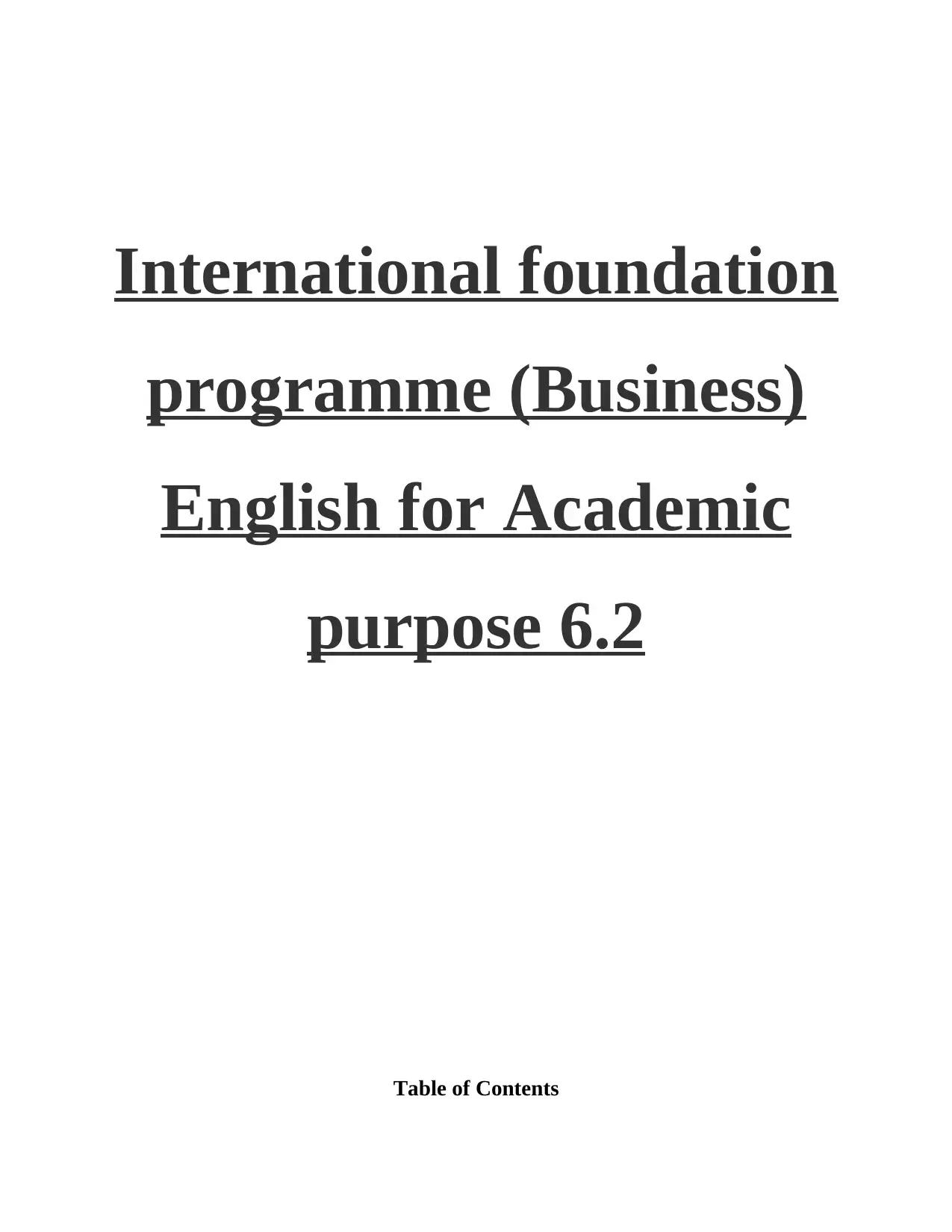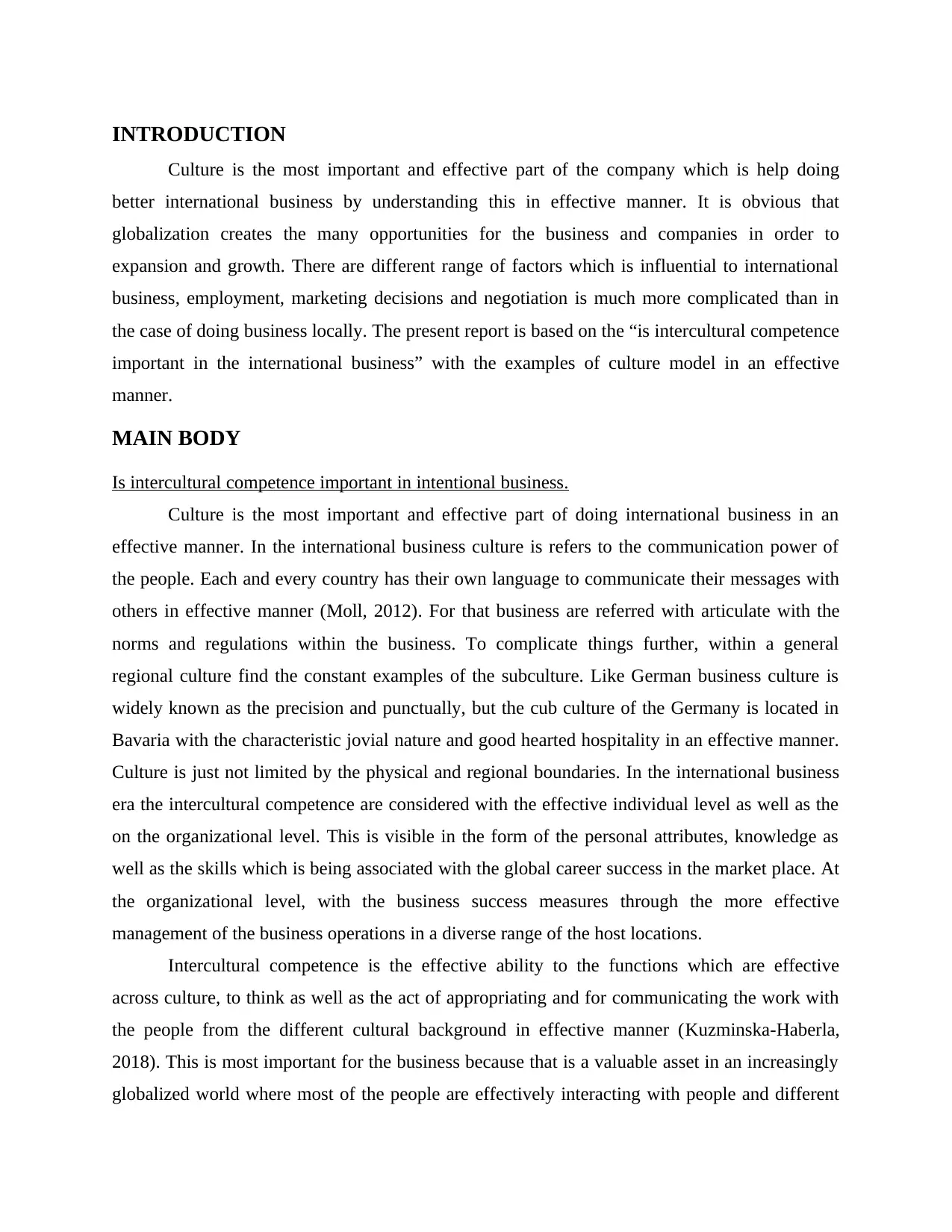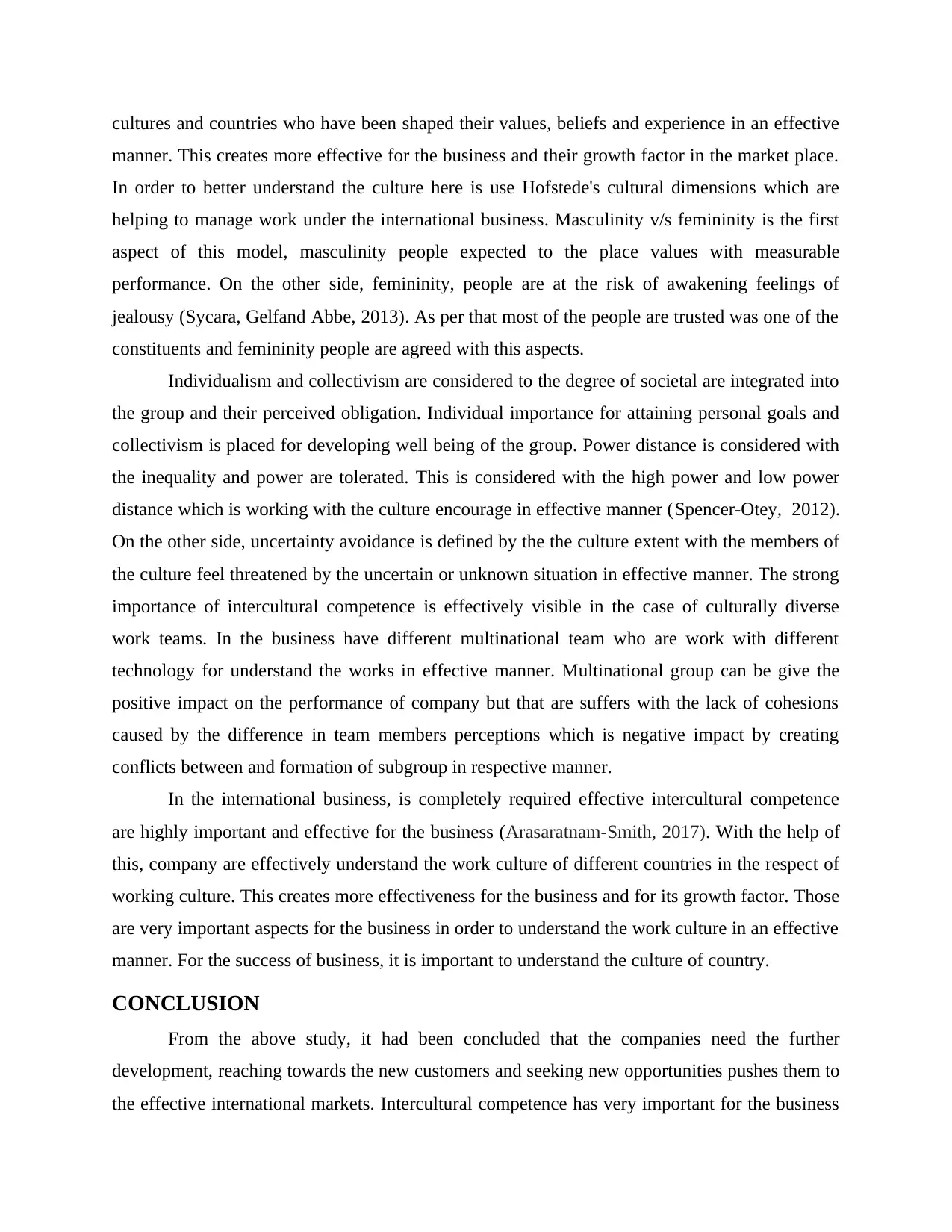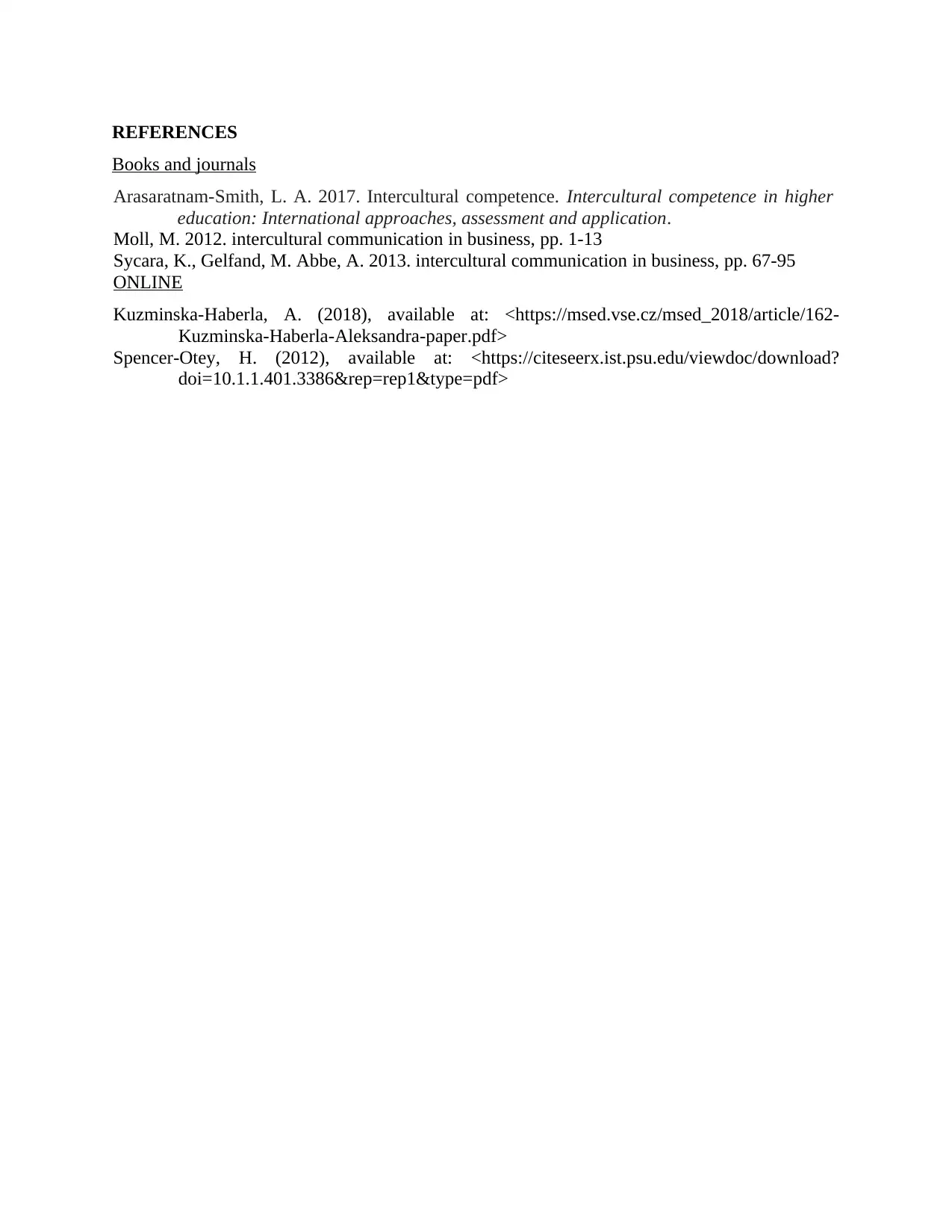English for Academic Purposes: Intercultural Competence Essay
VerifiedAdded on 2022/12/29
|6
|1043
|66
Essay
AI Summary
This essay explores the crucial role of intercultural competence in international business, arguing its significance in today's globalized world. It begins by defining culture and highlighting its impact on communication and business practices. The essay then delves into Hofstede's cultural dimensions, such as masculinity versus femininity, individualism versus collectivism, power distance, and uncertainty avoidance, explaining how these dimensions influence business interactions and strategies. The importance of intercultural competence is further emphasized through its application in diverse work teams and multinational groups, where effective communication and understanding are essential for success. The essay concludes that companies require intercultural competence to navigate international markets, understand diverse work cultures, and foster effective relationships with global partners, ultimately driving business growth. The provided references from academic journals and books support the arguments presented.

International foundation
programme (Business)
English for Academic
purpose 6.2
Table of Contents
programme (Business)
English for Academic
purpose 6.2
Table of Contents
Paraphrase This Document
Need a fresh take? Get an instant paraphrase of this document with our AI Paraphraser

INTRODUCTION...........................................................................................................................3
MAIN BODY...................................................................................................................................3
Is intercultural competence important in intentional business....................................................3
CONCLUSION ...............................................................................................................................4
REFERENCES................................................................................................................................6
MAIN BODY...................................................................................................................................3
Is intercultural competence important in intentional business....................................................3
CONCLUSION ...............................................................................................................................4
REFERENCES................................................................................................................................6

INTRODUCTION
Culture is the most important and effective part of the company which is help doing
better international business by understanding this in effective manner. It is obvious that
globalization creates the many opportunities for the business and companies in order to
expansion and growth. There are different range of factors which is influential to international
business, employment, marketing decisions and negotiation is much more complicated than in
the case of doing business locally. The present report is based on the “is intercultural competence
important in the international business” with the examples of culture model in an effective
manner.
MAIN BODY
Is intercultural competence important in intentional business.
Culture is the most important and effective part of doing international business in an
effective manner. In the international business culture is refers to the communication power of
the people. Each and every country has their own language to communicate their messages with
others in effective manner (Moll, 2012). For that business are referred with articulate with the
norms and regulations within the business. To complicate things further, within a general
regional culture find the constant examples of the subculture. Like German business culture is
widely known as the precision and punctually, but the cub culture of the Germany is located in
Bavaria with the characteristic jovial nature and good hearted hospitality in an effective manner.
Culture is just not limited by the physical and regional boundaries. In the international business
era the intercultural competence are considered with the effective individual level as well as the
on the organizational level. This is visible in the form of the personal attributes, knowledge as
well as the skills which is being associated with the global career success in the market place. At
the organizational level, with the business success measures through the more effective
management of the business operations in a diverse range of the host locations.
Intercultural competence is the effective ability to the functions which are effective
across culture, to think as well as the act of appropriating and for communicating the work with
the people from the different cultural background in effective manner (Kuzminska-Haberla,
2018). This is most important for the business because that is a valuable asset in an increasingly
globalized world where most of the people are effectively interacting with people and different
Culture is the most important and effective part of the company which is help doing
better international business by understanding this in effective manner. It is obvious that
globalization creates the many opportunities for the business and companies in order to
expansion and growth. There are different range of factors which is influential to international
business, employment, marketing decisions and negotiation is much more complicated than in
the case of doing business locally. The present report is based on the “is intercultural competence
important in the international business” with the examples of culture model in an effective
manner.
MAIN BODY
Is intercultural competence important in intentional business.
Culture is the most important and effective part of doing international business in an
effective manner. In the international business culture is refers to the communication power of
the people. Each and every country has their own language to communicate their messages with
others in effective manner (Moll, 2012). For that business are referred with articulate with the
norms and regulations within the business. To complicate things further, within a general
regional culture find the constant examples of the subculture. Like German business culture is
widely known as the precision and punctually, but the cub culture of the Germany is located in
Bavaria with the characteristic jovial nature and good hearted hospitality in an effective manner.
Culture is just not limited by the physical and regional boundaries. In the international business
era the intercultural competence are considered with the effective individual level as well as the
on the organizational level. This is visible in the form of the personal attributes, knowledge as
well as the skills which is being associated with the global career success in the market place. At
the organizational level, with the business success measures through the more effective
management of the business operations in a diverse range of the host locations.
Intercultural competence is the effective ability to the functions which are effective
across culture, to think as well as the act of appropriating and for communicating the work with
the people from the different cultural background in effective manner (Kuzminska-Haberla,
2018). This is most important for the business because that is a valuable asset in an increasingly
globalized world where most of the people are effectively interacting with people and different
⊘ This is a preview!⊘
Do you want full access?
Subscribe today to unlock all pages.

Trusted by 1+ million students worldwide

cultures and countries who have been shaped their values, beliefs and experience in an effective
manner. This creates more effective for the business and their growth factor in the market place.
In order to better understand the culture here is use Hofstede's cultural dimensions which are
helping to manage work under the international business. Masculinity v/s femininity is the first
aspect of this model, masculinity people expected to the place values with measurable
performance. On the other side, femininity, people are at the risk of awakening feelings of
jealousy (Sycara, Gelfand Abbe, 2013). As per that most of the people are trusted was one of the
constituents and femininity people are agreed with this aspects.
Individualism and collectivism are considered to the degree of societal are integrated into
the group and their perceived obligation. Individual importance for attaining personal goals and
collectivism is placed for developing well being of the group. Power distance is considered with
the inequality and power are tolerated. This is considered with the high power and low power
distance which is working with the culture encourage in effective manner (Spencer-Otey, 2012).
On the other side, uncertainty avoidance is defined by the the culture extent with the members of
the culture feel threatened by the uncertain or unknown situation in effective manner. The strong
importance of intercultural competence is effectively visible in the case of culturally diverse
work teams. In the business have different multinational team who are work with different
technology for understand the works in effective manner. Multinational group can be give the
positive impact on the performance of company but that are suffers with the lack of cohesions
caused by the difference in team members perceptions which is negative impact by creating
conflicts between and formation of subgroup in respective manner.
In the international business, is completely required effective intercultural competence
are highly important and effective for the business (Arasaratnam-Smith, 2017). With the help of
this, company are effectively understand the work culture of different countries in the respect of
working culture. This creates more effectiveness for the business and for its growth factor. Those
are very important aspects for the business in order to understand the work culture in an effective
manner. For the success of business, it is important to understand the culture of country.
CONCLUSION
From the above study, it had been concluded that the companies need the further
development, reaching towards the new customers and seeking new opportunities pushes them to
the effective international markets. Intercultural competence has very important for the business
manner. This creates more effective for the business and their growth factor in the market place.
In order to better understand the culture here is use Hofstede's cultural dimensions which are
helping to manage work under the international business. Masculinity v/s femininity is the first
aspect of this model, masculinity people expected to the place values with measurable
performance. On the other side, femininity, people are at the risk of awakening feelings of
jealousy (Sycara, Gelfand Abbe, 2013). As per that most of the people are trusted was one of the
constituents and femininity people are agreed with this aspects.
Individualism and collectivism are considered to the degree of societal are integrated into
the group and their perceived obligation. Individual importance for attaining personal goals and
collectivism is placed for developing well being of the group. Power distance is considered with
the inequality and power are tolerated. This is considered with the high power and low power
distance which is working with the culture encourage in effective manner (Spencer-Otey, 2012).
On the other side, uncertainty avoidance is defined by the the culture extent with the members of
the culture feel threatened by the uncertain or unknown situation in effective manner. The strong
importance of intercultural competence is effectively visible in the case of culturally diverse
work teams. In the business have different multinational team who are work with different
technology for understand the works in effective manner. Multinational group can be give the
positive impact on the performance of company but that are suffers with the lack of cohesions
caused by the difference in team members perceptions which is negative impact by creating
conflicts between and formation of subgroup in respective manner.
In the international business, is completely required effective intercultural competence
are highly important and effective for the business (Arasaratnam-Smith, 2017). With the help of
this, company are effectively understand the work culture of different countries in the respect of
working culture. This creates more effectiveness for the business and for its growth factor. Those
are very important aspects for the business in order to understand the work culture in an effective
manner. For the success of business, it is important to understand the culture of country.
CONCLUSION
From the above study, it had been concluded that the companies need the further
development, reaching towards the new customers and seeking new opportunities pushes them to
the effective international markets. Intercultural competence has very important for the business
Paraphrase This Document
Need a fresh take? Get an instant paraphrase of this document with our AI Paraphraser

in the today world. With the help of this company had able to aware about culture, self
awareness, values, attitudes helping in better understanding to others.
awareness, values, attitudes helping in better understanding to others.

REFERENCES
Books and journals
Arasaratnam-Smith, L. A. 2017. Intercultural competence. Intercultural competence in higher
education: International approaches, assessment and application.
Moll, M. 2012. intercultural communication in business, pp. 1-13
Sycara, K., Gelfand, M. Abbe, A. 2013. intercultural communication in business, pp. 67-95
ONLINE
Kuzminska-Haberla, A. (2018), available at: <https://msed.vse.cz/msed_2018/article/162-
Kuzminska-Haberla-Aleksandra-paper.pdf>
Spencer-Otey, H. (2012), available at: <https://citeseerx.ist.psu.edu/viewdoc/download?
doi=10.1.1.401.3386&rep=rep1&type=pdf>
Books and journals
Arasaratnam-Smith, L. A. 2017. Intercultural competence. Intercultural competence in higher
education: International approaches, assessment and application.
Moll, M. 2012. intercultural communication in business, pp. 1-13
Sycara, K., Gelfand, M. Abbe, A. 2013. intercultural communication in business, pp. 67-95
ONLINE
Kuzminska-Haberla, A. (2018), available at: <https://msed.vse.cz/msed_2018/article/162-
Kuzminska-Haberla-Aleksandra-paper.pdf>
Spencer-Otey, H. (2012), available at: <https://citeseerx.ist.psu.edu/viewdoc/download?
doi=10.1.1.401.3386&rep=rep1&type=pdf>
⊘ This is a preview!⊘
Do you want full access?
Subscribe today to unlock all pages.

Trusted by 1+ million students worldwide
1 out of 6
Related Documents
Your All-in-One AI-Powered Toolkit for Academic Success.
+13062052269
info@desklib.com
Available 24*7 on WhatsApp / Email
![[object Object]](/_next/static/media/star-bottom.7253800d.svg)
Unlock your academic potential
Copyright © 2020–2026 A2Z Services. All Rights Reserved. Developed and managed by ZUCOL.





